#draw heavily from source material
Explore tagged Tumblr posts
Text
🌓Like we know this is gonna be the theme of the video but holy shit does this constant need to produce leave the most sickening feeling in our stomach. It's something that, like, this bitch has worried endlessly if she's a plagiarist from the characters she creates inspired by others and these people are doing it boldly like no one has before. Oh my fucking god.
#chirps#Like do you know how many nights we stress about the fact that Yuni or Kokoro#draw heavily from source material#even though part of their deal is they're attempting to build further onto it#and making commentary on specific tropes or consistencies in media#(i.e. Yuni with genderbend media just. ending on status quo; Kokoro with how series will introduce filler that. Is insane in context)#but other creators are so incentivized to just... pump shit out!! that who cares!!#who gives a shit!!! nordvpn get their ass in here!!!!!#don't think about it just go go go!!!#we can't keep up with actual companies and corporations dedicated to churning out a mass of content so we have to pretend to!!!#fuck dude!#👑Pandora💔
10 notes
·
View notes
Text

happy holidays! here is some big dilf cable indulgence from me to you.
#nathan summers#cable#x-men#quote unquote daily drawing#heavily referenced from some silverback thirst blog#only the noblest of source materials here
65 notes
·
View notes
Note
Even if Dead plate wasn’t queerbaiting, it was DEFINITELY shipbaiting. The dialogue option about whether Rody is jealous of Vince’s possible gf, the hair drying scene, the way he stops correcting Rody about not calling him Vince… u guys r tumblr girlies, you knew damn well what you were doing LMAO. There’s nothing wrong w that lol - it makes for a fun dynamic - but don’t claim that queerbaiting never came into it pffft
My co-developer and composer who worked on the game are both men, calling us "tumblr girlies" is a bit condescending and disrespectful.
To queerbait or shipbait, it means we were taking advantage of possible queer characters and relationships as a means to appeal to queer audiences while maintaining ambiguity about the characters' sexualities. We don't believe the game was baiting anyone since again not only the sexualities of the characters aren't ambiguous as it was fully stated they were written as queer the moment they were designed way before the game was even developed, we've expressed multiple times that while the game does have themes of queerness and cannibalism the main plot and intention behind the source game was always intended to heavily focus on exploring the horror that comes from toxic and unhealthy obsessions and mindsets and how far one is willing to go for them (Rody's self-sacrificial and desperate love for Manon, Vince's selfish obsession for perfection, Rody and taste, etc). The game is about a waiter seeking out and realizing what happened to his ex-girlfriend, that's always been the main plot, Dead Plate is a game in the thriller/horror genre and there was not a single mention of the game having any possible romance in it nor the queer identities and interactions of the characters were used to promote the game in any of the official game pages or promotional material to draw in more audiences, so hearing that you're watering the game down just as some kind of shallow bait is a bit disheartening.
Sometimes characters just happen to be queer, and not all media with queer characters are strictly about romance. Their relationship is still up for audience interpretation and people can take them as whatever they like if they want to enjoy them like that as long as they aren't hurting anyone but we never meant to intentionally bait anyone into trying out the game using their queerness, and that as queer writers ourselves we've expressed time and time again how we wished people to check out the game for the overall narrative and message it has rather than for people to only focus and view the game as shipping material since we believe the game offers a lot more than that.
2K notes
·
View notes
Text
Character Thoughts: Character Design #1 - Chevalier, Gilbert, Leon
My personal outlook on the character design choices in Pri is that the primary objective of the artist behind them was to reflect personality of the suitor rather than to fit within any specific time period. As such, it becomes a question... What can be read from their looks?

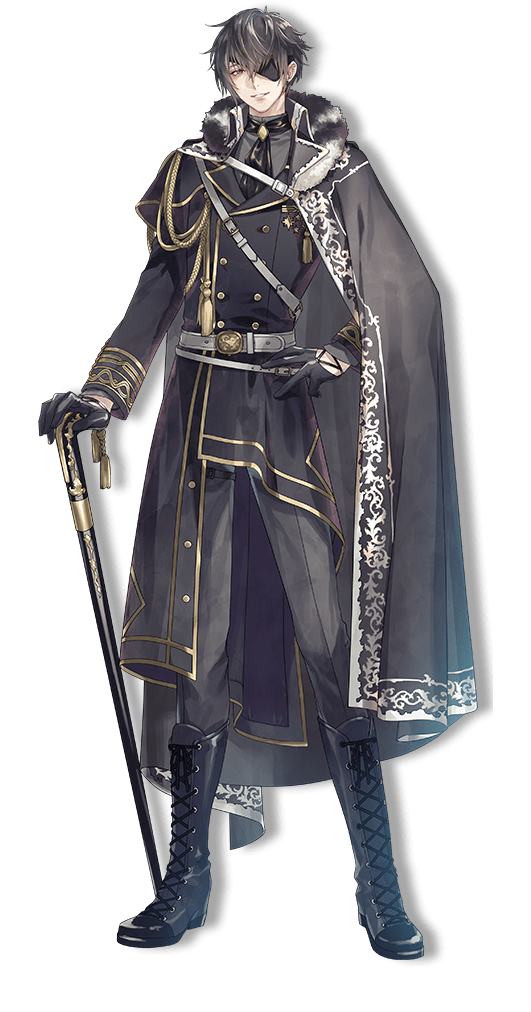
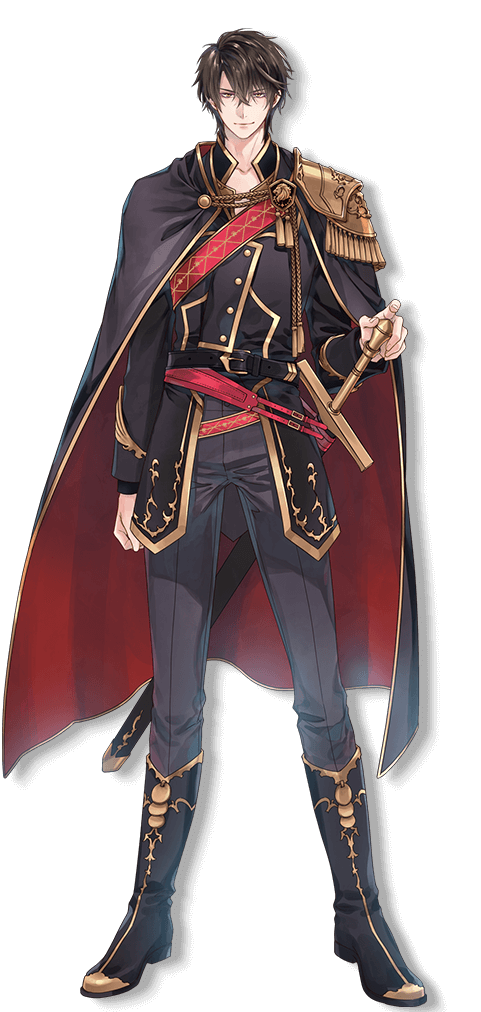
Images were sourced from @acrispyapple 's blog.
Chevalier
Chevalier's colour scheme is all black and white, with subtle golden touches. It is fairly simplistic and may draw forward the image of a white tiger -- a ferocious although rare beast. It creates a frightening backdrop for any blood that may be spilled... and accurately enough, may serve as a reflection of a binary logic mindset.
Asymmetric cape allows for greater freedom of movement. The arm he draws his sword with is not going to be restrained under the weight of fabric. His boots look suitable for horse riding and the cut of his jacket, I believe, is meant to resemble military uniforms of centuries prior. Chevalier is covered from his fingertips to his very neck -- there isn't a vulnerability exposed in him. He is vigilant, he is ready to act, he is guarded. His skin will not be first to be cut, poison will not enter his system without struggle, his hand will not slip on the hilt of his sword even as it grows slick from crimson. Chevalier is a knight.
But through and through, he is also royalty. The haft at his hip could be called subtly ornate, albeit the material it's been made of makes it more so "humbly" opulent. The gold he dons speaks of riches, as does the fur at his collar. He's a commander. He is a noble. His position clearly separates him from others.
Chevalier is eye-catching. And were he involved in battle? You'd fear what you'd see. As you should.
Gilbert
Black, white and gold also follow Gilbert around. However, if in Chevalier's case it could have been argued that the split between darkness and light was even, then Gilbert is the dark itself. The rest are merely accents. They do not reveal much of his mystery, do not offer anything past sparse commentary on it... And I believe they aren't supposed to. Gilbert is the unknown. He is threatening and he is very clear about it.
The orders at his chest, the cut of the lapels, his boots -- it is hard not to see signs of Gilbert being involved with military. However, his clothes have clearly not been designed for ease of movement. They seem heavy, like he could get twisted in them at any moment and collapse, not to mention the heat. Long and heavily adorned with patterned accents, gold, they speak of might... But of that becoming of a commander, not a person who fights themselves. The cravat at his neck is yet another sign of how far removed he is from direct action. It is both a liability in combat and a sign of status.
Gloves, cane and eyepatch. Why should a person of his age need them? Surely, this question comes with simple answers... But are they quite correct? There's a dissonance there. You can see his secrets, but it does not mean they will be revealed to you. He, after all, too is guarded.
Leon
Another character dressed in black! But... Leon's is different, isn't it? It speaks of mystery, of secrets, surely, but when combined with noble gold and warm red... It is almost as if he wanted to say "I wish I could tell you, but I cannot". Even if not everything can be made clear, it is evident his actions are underlined with royal scarlet of high ideals.
Leon is a hero. You can see it in his wear -- it is much too informal to place him among the military, but it undeniably shows power and readiness to take up direct action. The guard at his shoulder may be complex, but the same cannot be said about the design of the hilt at his hip. It is simple, so much so that it begs to ask who else could wield it. If that is his weapon of choice, how far above a common knight does Leon see himself? Or... does he consider himself to be above them at all?
Based on the quality of his clothing and detail put into it alone, it is evident that Leon is not a person you may pass on the streets. However, his hands are out there, completely unprotected. And the way he wears his cape? His belts? The sash? It is utterly proper. Even if the lapels of his jacket do not follow any standards for uniforms, it is still buttoned up as it should be. Relaxed (or as relaxed as it may be for royalty), it gives him a laid-back, reliable appearance. The lion insignia clearly signifies who he is.
What are you hiding, Leon? We are at arm's length. You shine too bright... Yet you also mean us no harm.
#chevalier michel#ikepri chevalier#ikemen prince chevalier#ikepri#ikemen prince#ikemen series#leon dompteur#ikepri leon#ikemen prince leon#gilbert von obsidian#ikepri gilbert#ikemen prince gilbert
222 notes
·
View notes
Text
Daily bloodletting materials
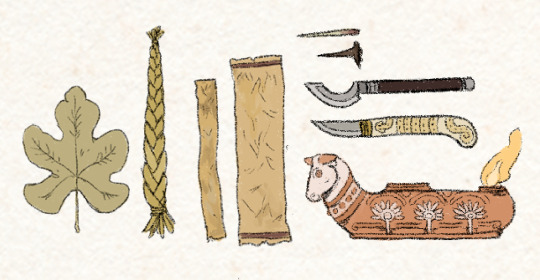
A selection of basic materials- a fig leaf, braided grass, two quality levels of bark paper, plant thorns, two bloodletting razors, and an oil lamp.
Bloodletting is an everyday occurrence used in prayer in the Wardi faith. This is understood as an offering of one’s living spirit to God as part of a wider cycle of death and rebirth that sustains the world, as well as sustaining God's connection, blessing, and protection to the individual and their kin. This is seen as a strict orthopraxic necessity and will typically be performed by all members of society.
For everyday prayers of laymen, orthopraxy focuses predominantly on the core mechanics of the offering rather than the exact materials used (material is of far greater significance in more specified rites, such as offerings to individual Faces of God or prayers with more specific purpose).
The fundamental necessary materials are:
A tool to draw blood.
This can effectively be any sharp implement, but it is expected to be used exclusively for the purpose of bloodletting and to not be tainted by other uses. Most people will have at least one blade designated for this purpose. Specialized bloodletting knives are typically small, short blades kept very sharp. Thorns and plant spines likely had more specific ritual purpose in the early history of the faith, but this has largely been lost with these natural materials being instead a practical means of drawing blood in lieu of having a designated blade. Use of thorns in prayer is an acceptable practice, but heavily associated with poverty.
An object to hold the blood offering and be fed into flame.
Most traditionally, this is a braid of dried grass. This is a readily accessible material throughout the region, and some traditions maintain that this is the optimal material. The grass has significance in its material nature, being a prime signifier of the cycle of death and rebirth (the grasses die off in the height of the dry season and are reborn with the rain, anointing this material with blood reflects broader understandings of bloodshed and sustaining life and affecting seasonal change). Using grass braids is not expected orthopraxy by religious authorities, but is demanded by most hardline traditionalists. Dried leaves are a rarer material of choice, with this practice only being standard among the rural northeastern Wardi (and otherwise tending to be used pragmatically as a quick and easily accessible material that can perform the needed ritual functions). The fig leaf is most common throughout the region (as a highly valued crop), while the oak leaf has unique import the the folk traditions of some northeastern Wardi groups. The practice of using bark paper is a more historically recent development, initially adopted by the priesthoods (especially with its utility as a writing surface, which figures into more complex rites) and slowly disseminated into laymen. This material was historically inaccessible and reserved for rites and writing of official documents, but has become more widely available as it is extracted en-masse from the more wooded northeastern tributary regions.
A source of flame.
This flame source, if re-usable, is expected to be utilized only for prayers and offerings (using one's cooking hearth to light the flame is appropriate, offering into it is not (outside of specific rites)). Most households will have at least one oil lamp in their shrine used for this purpose. In lieu of this, any fire can do in a pinch (so long as it is not reused- lit at the start of the rites and extinguished at the end). Dry dung is the most common and accessible fuel source in the region, and the dung of cattle and khait (and no other animal) is considered ritually pure and appropriate for this task.
These daily offerings will usually occur at a shrine within the home. This shrine will consist of these core materials, as well as others used for additional rites- this will usually include object representations of each of the seven Faces of God (and often additional epithets) when one needs to pray to a specific Face. These are most traditionally carved/molded figurines and/or parts of animals. Of the highest value is parts of animals killed in right sacrifice, which have been transformed into the body of God at the moment of death and hold greater ritual power (one can perform binding oaths by laying hands upon them). Most shrines will ideally have at least eight offering bowls (one for each Face and one for general offerings and bloodletting). Animal sacrifice is only officially condoned to be performed by priests, and offerings by laymen are instead gifts of food, drink, incense, and precious materials.
Daily bloodletting rites occur at the end of the day, after one has bathed. The flame is lit at the start of the rite. One 'calls in' God to the flame with a sung invocation as they draw their blood. For daily offerings, this cut can be tiny- only a singular drop of blood is necessary. The blood is deposited on the flammable material with a second invocation, and given time to dry as the person performs their prayers. The core bloodletting rite is about maintaining a spiritual connection rather than receiving anything additional in return- if one is praying for something specific, other offerings are made at this time (generally food, grain, drink, as appropriate to the request). Upon completion of the prayers, a third invocation is sung and the blood offering is burnt in flames, with the ashes being allowed to fall into an offering bowl (these ashes are ritually purified and may be used in other rites). The extinguishing of the flame signals the end of the rite.
After this point, the blade must be cleansed on both physical and spiritual levels- wiped with water, vinegar, or a dry cloth, in tandem with the gesture against evil to dispel any minor impurities. If available, most families will have their offering materials blessed by a priest at least yearly to dispel any greater impurity. Physical and spiritual cleanliness is of great importance (and are not distinct concepts) within this worldview, and many curses or other forms of pollution will be ascribed to performing these rites while unclean.
108 notes
·
View notes
Note
Would you elaborate on why you don't really believe in addictive personalities? I find that a useful descriptor for myself that reminds me how easy it is for me to get into unhealthy behavior patterns. I have to fully stay away from tiktok and gacha games(I will never go gambling) because I know I can't trust myself with them. I also have to be REALLY careful with alcohol, etc. I have adhd and bi-polar, and I like having a phrase that describes my experience without being too over-medicalized and relating everything to diagnoses. I'm curious why you don't like it as a construct/whatever your opinion is!
personal explanatory power is one thing and i wouldn’t begrudge you that but i don’t really see how it has any materialist usage; and ultimately, like, i’m a marxist, any way in which i evaluate a framework that’s supposed to explain something in the world has to come from the assumption that the world is best explained through historical materialism. ‘addictive personality’ with no further elaboration is an idealist claim which obfuscates crucial points of discourse around addiction and the conditions that give rise to it—and indeed the conditions which cause us to name one substance or action as ‘addictive’ over another in the first place. addiction is materially punished; through social stigma, but also through housing discrimination, workplace discrimination, policing & incarceration, psychiatry, the sorts of forces that add up to eventually facilitate the conditions of social murder. we only have to look as far as the war on drugs to understand how ‘addiction,’ the consumption and circulation of substances regarded as ‘addictive,’ is not a prediscursive state but one that can be leveraged to violently enforce conditions of hegemony and quell insurgence through carceralism and social murder. i also just heavily distrust psychology as a field and certainly don’t buy these appeals to an essential self as a self who ‘has’ xyz tendencies as though xyz tendencies (such as the traits given in the five-factor model which is applied to ‘explain’ a predisposition to addiction) are anything other than postdiscursive descriptors we’ve imbued with meaning relative to a postdiscursive normalcy. i think psychological theorising around personality tends to obfuscate materialist frameworks in favour of methodologies which presume and reify normativity (eg. the claim that those more vulnerable to ‘addictive personalities’ have a stronger tendency towards ‘social alienation’ and ‘nonconformity’ without defining what constitutes ‘alienation’ and ‘conformity’ in the first place—as though personality traits simply appear out of thin air).
as we’ve seen dozens of times, “addiction” is a slippery term easily wielded towards reactionary ends. “porn addiction” is a line taken by anti-sex work radfems; “food addiction” is infamously unscientific and preying on cultural predispositions towards fatphobia; “internet addiction” is similarly flimsy and frequently deployed in theories of cultural degeneration. this doesn’t mean that the clusters of behaviours we term “addiction” aren’t “real” in the sense that some people do develop dependencies on particular substances, but that the term can be used to draw connections between the reactionary attitude held towards addiction & its attendant connotations (of infantilisation, justified removal of autonomy, incarceration, psychiatric intervention, and so on) and whatever the wielder wants to malign (porn, food, using the internet). if we reify the idea of there being an ontological state within ourselves by which we are more or less prone to “addiction,” we by implication act against the necessity of interrogating what is meant by “addiction” and why it is being invoked in the first place; we also place all our explanatory eggs, so to speak, in the basket of the individual cast as “addicted,” rather than turning our attention towards the source of the “addictive” substance or object and its material origins + usage.
so it bears asking what we’re obscuring and what we’re facilitating when we give legitimacy to the idea of an ‘addictive personality’ in the public discourse, which is what i meant when i said that the term has no materialist explanatory power for me—casting someone in the role of an addict, even if only in the hypothetical, allows others to enforce the stigmas that such a role entails, through, for example, infantilisation, denial of autonomy, and reluctance to treat the individual’s behaviour as worthy of respect, compassion, and mature response. it creates a telos out of addiction under conditions wherein addiction means incarceration (literal or psychiatric), discrimination, ostracisation, everything i just laid out in the first paragraph. it makes addiction into a fundamentally individualist discourse which must therefore have individualist solutions, rather than a complex nexus of social conditions and discourses that we can describe and then fight against.
457 notes
·
View notes
Text
Similarities between Transformers One and the Aligned Continuity (aka Transformers: Prime)
Watching the trailers and reading the interviews made me realize that there are many similarities between TF One and the Aligned Continuity. As a reminder (or for those who don't know)- the Aligned Continuity consisted of the War for Cybertron games, Transformers: Prime, Robots in Disguise, Rescue Bots, etc.
Transformers: Prime got me into the fandom, so it's interesting to see a multi-million-dollar movie use elements from the continuity it is a part of.
Here is a list of similarities I have found so far.
Note: I'll also be mentioning IDW1 briefly since the Aligned continuity and IDW1 comics have similar concepts and have constantly exchanged ideas with each other.
Megatron's name: D-16
In TF One, D-16 will become Megatron. D-16 is a name directly taken from the Aligned Continuity and has been solely associated with it until now. Even though Prime Megatron and IDW1 Megatron have very similar backstories—both being miners and then revolutionaries—only Aligned Megatron was also known as D-16.
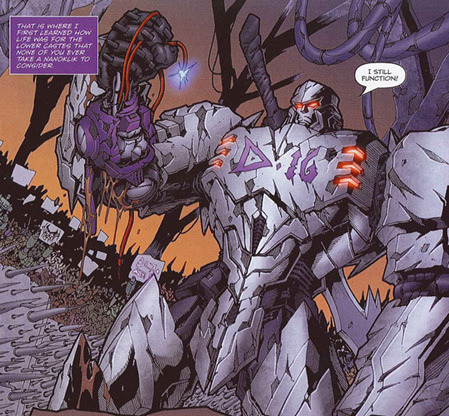
Caste system/Social Inequality (hinted)
In both the Aligned and IDW1 continuities, pre-war Cybertronian society had a rigid caste system where one's role in society, thus their life, was determined by their alternate mode (Functionism in IDW1). In Aligned, Orion Pax's desire to learn more about this system, specifically the corruption and inequality it created, leads him to find Megatron (as described in Exodus and TF: Prime). The two become friends who desire change for their society. The interviews with Josh Cooley (the director) hint that something similar exists on Cybertron and is the main cause of their fallout.
The thing that starts the wedge between him [D-16] and Orion Pax is that the world is not what they thought it was, and they then start to form two different views on how to solve the problem.
(Entertainment, Comic-Con 2024 Issue)
In addition, someone on Twitter -who saw an early screening-said that the movie was "very in-line with IDW's ideas for how the war started," so it's safe to say it draws heavily from Aligned/IDW.
Extra note: Another interview with Cooley revealed that in an early version of the film, Megatron was supposed to be a gladiator. He and Orion Pax were also supposed to have "very different backgrounds" - which sounds very similar to the data clerk and gladiator origins of the Aligned continuity.
Unfortunately, the limited runtime meant Cooley had to limit how much of the characters' origins to show on screen, including changing part of Megatron's accepted story. "If we had all the time in the world, it would've been fun to show Megatron as a gladiator and have the two characters come from very different backgrounds," Cooley added. "We actually had a gladiator scene that alluded to this origin that was cut out." Instead, Orion and D-16 are reimagined as bunkmates working as miners to bring Energon back to the planet after a years-long drought.
(IndieWire)
Cooley also mentioned being given a "bible" of the franchise's entire lore, which reminds me of the Binder of Revelation Hasbro made, or the source material for the Aligned Continuity...
The 13 Primes
The 13 Primes will appear in the movie (you can spot them in both trailers). The idea of the 13 Primes isn't new, but this particular group version is heavily inspired by the Aligned Continuity. In Aligned, Alpha Trion is canonically one of the 13 Primes (aka the Covenant Primes, who also include Prima, Solus, and Megatronus). He wasn't considered a Prime in other stories before TF: Prime. The Covenant Primes also appear in Cyberverse and Earthspark, and TF One continues the trend.
Below (in order):
Onyx Prime design from the Covenant of Primus
A mysterious statue (being?) from the trailer that looks very much like the Aligned Onyx Prime
Mysterious beings (Primes?) behind Optimus
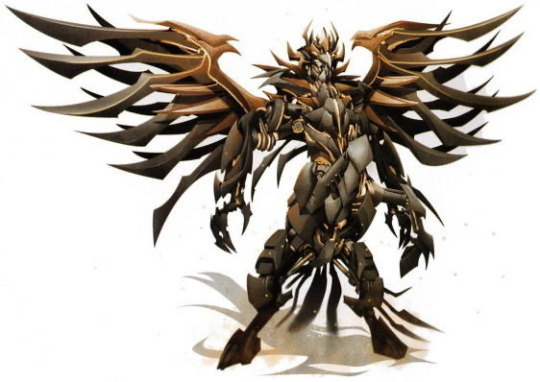
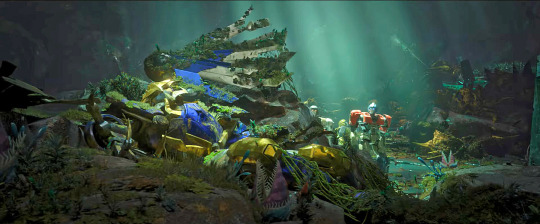
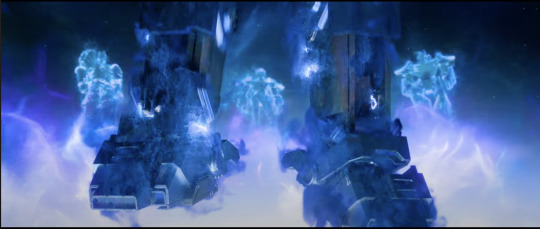
Airachnid
The design for Airachnid in TF One is very similar to the design in TF: Prime. Both have the "arms" on their backs and similar head shapes.
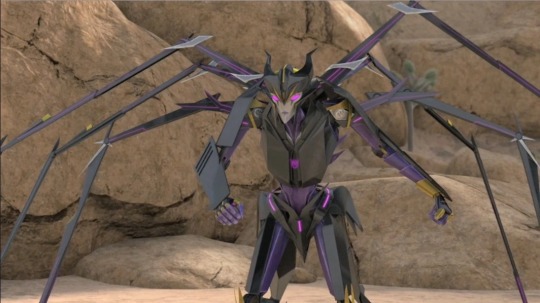

Vehicons
Some Cybertronians look like the Vehicons. Looks like we're getting multiple Steves….
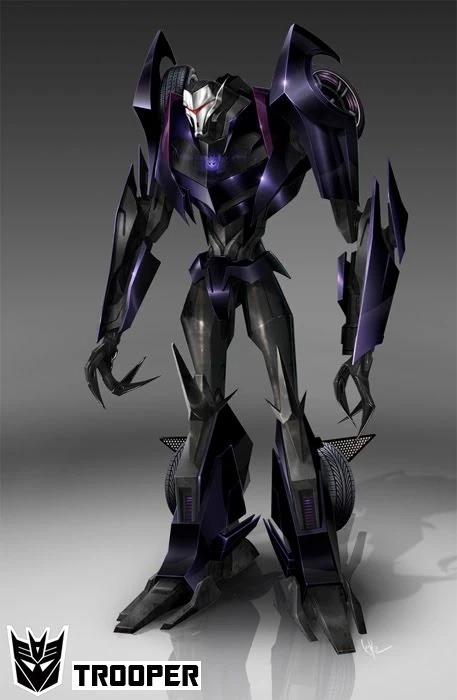
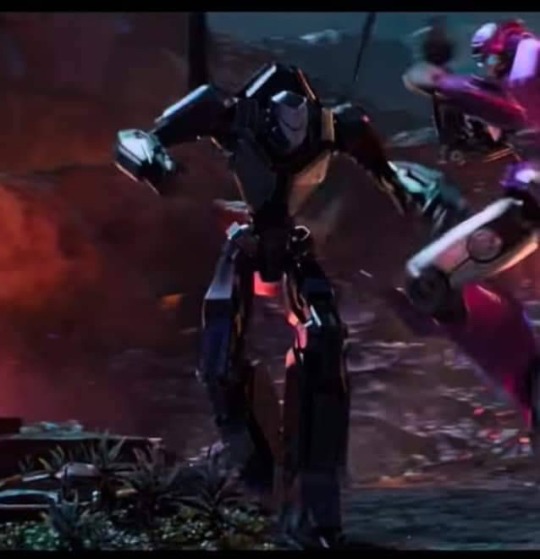
Extra: Brian Tyler
Not directly related to the story, but the composer for Transformers: Prime (aka the genius who made the ionic Prime theme) is back and composing the music for the movie. If I hear the Prime theme in the movie theater, I might start screaming. 😂

I think it's so cool to see how much influence one continuity can have on the franchise, so much so that its elements are used in a movie that'll soon be seen by millions of people and future generations.
#transformers#transformers one#tf one#tf one trailer#transformers prime#optimus prime#maccadam#megatron#tfp#bumblebee#elita 1#transformers aligned continuity#transformers idw1#transformers d-16#tf megatron#tf optimus prime#tf orion pax#ck17rambles#starscream#Orion pax
61 notes
·
View notes
Text
Glitch IS meant to be Force sensitive, here's why
Clone Trooper Glitch Who Is Definitely Force Sensitive.
As far as I can tell, everyone has fallen in love with that idea and everyone is now saying "Glitch is Force sensitive and you can't convince me otherwise."
Listen, what if I can actually convince you he is, with literary analysis?
I don't think I've ever seen this particular angle discussed (not that I have looked too hard, but no one ever brings it up when talking about Glitch). Everyone just loves the idea that he's Force sensitive because it's a lovely / exciting idea. And, okay, it's never stated outright in the source material, so there's some room for doubt. (And it was obviously intentionally left open-ended.)
BUT
I think the subtext, for those who know what it is, is so thick it might as well be an open admission of authorial intent. You see, Glitch's comic, Defenders of the Lost Temple, is drawing heavily on the Knights of the Old Republic comics in its lore. The Gauntlet they're sent to recover comes from that series. The moon where it resides is named after one of the characters from the series and likely is the moon he moved to at the end of his arc, and there's a statue of him there. There are all these deliberate, easily proven links to the series.
And there's also the less direct but still present parallel of questioning whether Jedi should be fighting in a war at all - Knights of the Old Republic (comics) takes place at the beginning of the Mandalorian Wars when some Jedi went to fight and others argued that wasn't their place, and some people get caught in the conflict without ever wanting to. That's a more dubious connection, and may not have been deliberate, but...
That is - the writer knew what he was doing here, in relation to previously published material.
The main protagonist of that series is Zayne Carrick.
Zayne is a sort of off-beat Jedi (well, almost-Jedi). He is just about Force sensitive enough to be admitted to the Jedi Order. He has "a special relationship with the Force." His special relationship with the Force mainly manifests in him being very clumsy and having the worst sort of luck. No one really thinks he'll make it as a Jedi. His own fellow padawan friends don't think he'll make it as a Jedi. But he's so good and caring and trying. And in the long run, he learns to work with his bad luck, and it turns out it's not so much a bad luck as the Force working... as a sort of swing, around him, with a balance of good and bad events. Things rarely work out as expected, but he learns to expect the unexpected. And once he does, and learns to ride the waves instead of trying to swim against the current, it actually works mainly in the heroes' favour.
Does that remind you of anyone?
Yep.
I'm pretty sure Glitch is a deliberate callback to Zayne Carrick and his special relationship with the Force.
I don't know if he started out that way from the start, or if the idea of "what if a clone was Force sensitive" came first and this theme just slotted into place later (honestly, the latter is probably likelier). But it's undeniably there; with all the other references to KOTOR, it's unlikely the author would have missed the main protagonist's character arc re: Force sensitivity.
Glitch has a special relationship with the Force exactly like Zayne's. He just has, unlike Zayne, also the bad luck of never having been tested for Force sensitivity. (This is all EU/Legends. Don't expect New Canon to stick to any of the above.)
#clone trooper glitch#star wars#star wars legends#star wars extended universe#star wars eu#meta#analysis#defenders of the lost temple#star wars lore#knights of the old republic comics#zayne carrick#glitch is force sensitive#glitch is force sensitive because zayne carrick is force sensitive
66 notes
·
View notes
Text
Well Hello (part 2)

tom blyth x fem reader
word count 1.7k
mature 18+
https://www.tumblr.com/daemonslover/739845802239934464/well-hello-tom-blyth-x-fem-reader-word-count-19k?source=share
Part 1 ^^^
hey guys!! so glad you enjoyed part 1 here's part 2!!
recap:
"Sorry for the interruption, class. This is Tom Blyth; he's been working for me for two years and will be assisting this semester." You cautiously raise your head, hoping it's not who you think it is. And there's the man you met in the bar, smirking at you
Your professor's surprise introduction of Tom makes you uneasy. The mention of Tom working for the professor for two years makes you realize how naive you were to not consider him working at a university. He was in his twenties and was intrigued when you mentioned that you were a graduate student; everything was coming together. He kept staring at you the entire class, so you couldn't concentrate on the material. The familiarity of that smile evoked memories of the bar encounter and that night, increasing the uneasiness. All you could think was, "What if this gets out?" "what if he black mails me?"
"Remember discussion one will be due next class" Finally, the professor dismisses you all to go. You leap out of your seat and try to find the nearest exit. You don't even want to look around to avoid accidently seeing him. As you exit the classroom, you check both hallways to see if it's clear. Feeling relieved as you see only students, you begin to go out. While going around the building looking for a way out, you take time to enjoy the architecture and paintings on the walls. The marble walls and magnificent pillars throughout the rooms are adorned with portraits of former professors and school presidents.
“Well hello”
The very voice you didn't want to hear made your entire body feel like it was ready to crumble into a million pieces. The panic that erupted in your body was so intense that you thought you'd pass out. You cautiously turn around, hoping it wasn't him and your mind was playing tricks on you. Nonetheless, it was him. As horrible as it sounded, he looked very attractive. His hair was perfectly messy with just the right amount of curl, his suit was fitted to perfection, and his blue eyes sparkled in the sunlight.
Tom's interruption snaps you out of your contemplation, and his smirking remark sends a shiver down your spine. "Cat got your tongue?" he says, his tone laced with a hint of amusement. "Please leave me alone, I could get in trouble," you manage to say, feeling vulnerable and uncomfortable. You sound desperate, expressing the fear Tom's presence has caused you to feel. Tom leans in slightly, making the encounter more personal. "you should of thought about that before you let me fuck you" he whispers, his voice carrying a sinister undertone.
The decision to walk away and dismiss Tom in your head seemed like a reasonable strategy to avoid escalating the situation. However, as you take a few steps to distance yourself, you feel a firm grip on your arm. Tom's grasp is unexpected and forceful, causing a ripple of concern among students who witness the scene. "You will not walk away from me," he asserts, his words sending a chill down your spine. The whispers and concerned looks from your peers amplify the anxiety within you. The last thing you want is to draw attention and jeopardize the hard work you've put into reaching this point with getting into grad school.
In an attempt to defuse the situation, you hesitantly suggest, "If I meet you somewhere will you stop, you are causing people to stare." You're taken aback by Tom's response when he smiles, as though he's satisfied with your cooperation."Meet me at the Italian restaurant tonight at 6 p.m.; it's six blocks from here," Tom vanishes into the distance, but your classmates' looks and murmurs remain. The impending meeting weighs heavily on you, and you can't get rid of the terrible sensation that this meeting with Tom will have repercussions that go far beyond the classroom. With a strong will to safeguard both your reputation and your own welfare, you struggle with the unknown that is going to be at the Italian restaurant later that night.
Because of the awkward situation in class and your meeting with Tom coming up, you decide to take a break and see the beautiful city that surrounds NYU. Your first stop will be Central Park, which is close and quick to get to. When you walk into the park, which is a big green oasis in the middle of the city, you can relax and enjoy the peace and quiet it offers. Getting away from the busy city and into the quiet park is a nice change of pace. You can feel the ups and downs of life all around you as you sit on a bench or walk along the winding paths. The sounds of children laughing, street musicians playing, and couples talking quietly together make a symphony that is nice to listen to. This temporary escape gives you a sense of stability and connection to the life of the city. The different stories, emotions, and experiences of the people you see remind you of how strong and bright you are beyond the problems you're facing right now. The break is helpful because it gives you time to get stronger and see things more clearly before facing the unknowns of the evening.
Later in the day
You eventually get home after exploring New York City. It's finally time for you to get ready and face Tom. You look at the clock and see that you have around 2 hours to get dressed. Although you know it's wrong, you're looking forward to seeing what happens tonight. Morally, this is terrible and could wreck your life, yet the sneakiness appeals to you.
For something easy but eye-catching, you choose a black dress with a low-cut back that has a subtle charm. The fabric drapes beautifully, drawing attention to your shape while keeping a sense of class. You chose the dress on purpose; it's sexy without showing too much. You are once again standing in front of the mirror as you get ready to see Tom. A quick touch-up of your makeup and hairstyle.
"Get your shit together, this isn't a date," you explain to yourself. This isn't about love; it's about telling him off. Hidden beneath the surface, two strong emotions are battling: the need to hold on to your anger and a deeper, more complex desire.
One last look in the mirror turns into a quiet pep talk. You can't get the words out of your head; put your feelings aside and look at the situation clearly. You know in your heart that the water below is rough and that you are pulled between being furious and having an unpleasant desire that you can't avoid.
As soon as you walk into the Italian restaurant, the mood changes. The soft glow of the warm lighting and the chatter of the people eating make the room feel cozy, but as you look around, you can feel the stress in the air. When you see Tom in a booth in the corner, you feel a rush of nervous energy. As you get closer to the table, your mixed feelings get stronger. When you see Tom, your heartbeat speeds up. "So glad you showed up, love; you look incredible."
As Tom pulls out your seat, you can feel the stress in the air. Thanking him for his kindness, but there is a lot of tension between you two that you don't say. There is silence at the table, and the things that aren't said form an invisible wall.
Before you can start talking, the waiter comes in and gives you a break for a while. After the orders are made. Tom breaks the silence "I'm sorry for my outburst earlier, dove." He tries to hold your hand, but you automatically pull away.
With a snarky tone, you say, "The only reason I'm here is to talk with you about how we will move forward this semester because this will never be a thing." The words give off an air of distance, which is a way to protect yourself from how vulnerable the situation is. You're struggling with mixed feelings deep down—a desire for his touch that has been going around in your head since that fateful night—but you're determined to hide them.
This outraged Tom. He knew it was all an act; he knew what was going through your mind right now was to appear uninterested because you were frightened of losing your place at NYU. This is a reasonable cause, but he would not tolerate her attitude and hatred toward him. Tom quickly rose up from his seat and grabbed your arm, leading you to the bathroom.
He forced you into the restroom and shut the door. Thankfully, there was just one stall.
You knew where this was going, and surprisingly, you weren't upset about it. Yes, you came here to warn him that this is wrong, but you knew that giving him an attitude would make him want to fuck you even harder than before. "Tom, we can't do this again," you plead, knowing that it will make him want you even more. Tom approaches you, puts his hands on your waist, and kisses your neck. This causes the warmth between your legs to rise into your stomach. He pushes two fingers into your throbbing pussy, causing you to gasp. "Tell me you aren't enjoying this love.'' You chose to wait to react so that it didn't seem like you were giving in so soon.
You finally give in and gasp out his name, "Tom, oh fuck, please," which fills his eyes with lust as he watches you squirm beneath him while he plays with your pussy, despite the fact that you just minutes ago pretended to despise him. "Look at you begging for me in a restaurant bathroom like a little slut, tell me you want me" he continues to rub circles around your clit, rubbing the right spot every time. "Please, Tom, I need you inside of me." Seeing the redness around your chest and your sloppy movements as he thrusts his fingers in and out of you, he knows you're approaching your climax.
He abruptly stops just before your climax, jolting you out of your sexual trance and confusing you. Tom leans down and says, "Fix your attitude, then I'll let you finish." "See you in class dove." he says, and walks out of the stall, leaving you sexually frustrated, with dripping underwear, and fucked up hair.
#tom blyth#tom blyth x reader#tom blyth smut#tom blyth imagine#coriolanus snow#coriolanus x reader#coriolanus snow smut#coriolanus x you#the hunger games#the ballad of songbirds and snakes#tbosas#young coriolanus snow#corio snow#coryo snow#coryo x reader#coryo smut#coryo snow smut#coriolanus snow blurb#corruption kink#doctor kink#naive girl
131 notes
·
View notes
Text
Napping time 👶💤
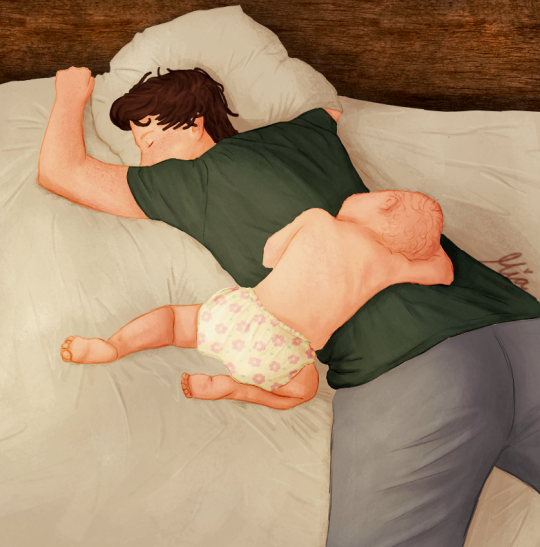

Little Amanda often had trouble falling asleep...even after being fed, having a new diaper and being sung to all afternoon by Harriet. When she walked into the bedroom, to wake her sleeping husband, trying to ask for help, Amanda's chubby little arms reached out and her fussy little sounds turned into something coherent for the first time.
"Dada!"
Harriet's eyes went wide. Her first words!
And Harriet understood them so clearly. Amanda missed her dad! Of course! She just wanted to be close to him, snuggle up to him and feel his comforting warmth. Harriet lips curled into a smile as she gently kissed the girl's head, before letting her down on the mattress.
Straight away, Amy crawled to Sebastian and curled right on top of his back, her little fist holding tightly onto his shirt. It barely took a minute before her eyes were closed, her breathing slowed and her fussy sounds were turned into the smallest little hums.
Harriet couldn't help but watch this peaceful picture in front of her. She took in the little snores from her husband, the steady and synced breathing of them both and the soft shake of her daughter's curls. They have grown much darker since her birth and with every day passing by, she looked more and more like her father. She was just as curious and smart like Sebastian.
But the way she missed her dad, whenever he left the house or even just the room and immediately wanted to shower him with kisses the moment he was back...that was just like her mother.
They both loved Sebastian endlessly and they always would.
After giving both a soft kiss to their temple, Harriet left the room, chuckling to herself at the thought of telling Sebastian Amy's first words.

Okay, okay...I told myself I would post Harriet's and Sebastian's story more "chronologically" except for my lake drawing, buuuut...I wanted to draw dad!Seb so desperately, I had to do this first!
This is a heavily referenced artwork, because I'm definitely not an artist that can draw a body free hand 🤣 And also this is more in a modern style, because again...I'm not a highly experienced artist, so I stayed very close to the source material 🙈
I hope you still like it and can gush over dad!Seb with me! 💕
divider by @saradika
#my art#sebastian sallow#sebastian#sebastian sallow hl#sebastian sallow hogwarts legacy#sebastian sallow x mc#sebastian x mc#sebastian sallow x oc#sebastian x oc#harriet lancaster#harriet arabella sallow#hogwarts legacy#hogwarts legacy mc#Amanda Mary Sallow#Amy Sallow#drabble#hogwarts legacy drawing#hl drawing#drawing#hogwarts legacy drabble#hl drabble
125 notes
·
View notes
Text
I don't think I really enjoyed the latest chapter, and honestly from the way things are looking I'm probably not going to enjoy Jujutsu Kaisen's ending either....
I obviously like the characters, I like Yuji, I like Nobara, Megumi is alright.....I get wanting them to be happy. A lot of the stuff I draw in fact involves putting characters I like into silly situations as though they aren't in constant suffering in the source material (I'm immune to being serious 💔).
However, I feel like I'm not really vibing with this 'the trio is alright and they'll all be happy together' ending it seems Gege is setting up. I think part of it stems from the way Nobara and Megumi have been handled these past chapters. There was so much hype for Nobara's comeback.....I get it, she's a badass and fun character who's time in the story was cut awfully short.....I really do understand why so many people would want her back, but I just don't really like how close to the ending her return was and also the fact that up until that point it seemed pretty heavily implied that she had died. Not only that but her 'death' was such an important moment for Yuji and part of what made Shibuya and Yuji's story so tragic and Mahito so reprehensible as a villain. Nobara coming back so suddenly without even proper time dedicated to her (as in actual hints that she was alive and more chapters to explore the dynamics of her return and her contributions to the battle beyond one move) to make it feel even a smidgen satisfying just didn't sit right with me. The first thing I thought of upon seeing the chapter of her return was that it felt like fanservice. It felt like the type of thing a fan of the story would write for the 'hype' and not a choice that made sense. It was the same thing as Yuta returning in Gojo's body. People like Gojo, and having a chapter make it seem like he was coming back of course got the fans' attention. But in the end the story could've still worked well, maybe even better, without Yuta-jo's addition to the fight. It was unessecary.
Then we have Megumi who's been through so much for a good chunk of the story now. His body was taken over and used to hurt people he cares about, most of all his sister who is pretty much the center of his world, the person he loves the most. He'd given up, he'd sunk to the lowest depths submerged in Sukuna's evil. I feel like he sprung back pretty quickly......I don't think I'm as iffy about Megumi's return as I am with Nobara's considering Megumi actually at least got some pretty good and decent scenes with Yuji getting through to him and now also a talk with Sukuna.....but I dunno, I still don't know if I enjoyed how it was handled, particularly the fact that he just kind of comes back with no consequences after all the shit Sukuna's put his body through. I mean, he has a couple of scars sure but is that really all you'd expect after the world class beating he just got?????
Then we have Sukuna, reduced to glob of flesh. I don't mind Sukuna getting a pathetic death. After all he's done I think he deserved getting flung off his high horse and trampled on the ground. It still felt really abrupt though and like it didn't get enough time considering he's been such a big pain for months now and is one of the major antagonists. He's just suddenly gone and it felt anticlimactic and unsatisfying. I would've also liked to see at least a bit of what he was like in the Heain era.....
Hakari and Uraume too 😭. We really got none of their fight and when Sukuna is gone Uraume just....evaporates???? It honestly felt like Gege was just trying to get them out of the way so the series can end already and not an actual conclusion to their character. I wish they could've gotten more depth beyond being just Sukuna's loyal servant.
Them there's of course all the things Gege still hasn't touched such as Jin being Sukuna's twin, Kenjaku being Yuji's mom, the merger etc. Those things I guess I'm not as sad about because I'd already come to terms with the fact that Gege isn't going to get into them, at least not to the extent I would've wanted. It still sucks though.
Maybe I'm just a hater, maybe I don't understand what Gege was trying to do, maybe it's just a matter of preference. I think Gege probably tried his best with jjk using what he had and I don't think it'd be right to hate on him. And even if I am kind of dissapointed in where this story is going I don't blame anyone for liking it.
I may just not like 'happily ever after' endings or something. Not to say Jujutsu Kaisen is some super uplifting story even if the main trio has survived. There's still characters who have died and stayed dead, but it's still definitely a happier ending than what I expected.
At the end of the day, I like stories that put their characters through the wringer. I like stories that destroy everything their protagonist has ever had and turn their world upside down and accept no half-assed reparations to the damage they've caused. I like stories that fuck up everyone involved but still let at least one of them be smiling by the end, even if they're alone, because life is still worth living. Honestly, I would've preferred Yuji move on by himself than for a happy ending to be squeezed out of jjk's remains in a way that didn't feel satisfying. Though maybe I wouldn't be so sour about an ending where the trio gets to live together if we had just had more time to make it feel right. To make it feel emotionally impactful and like it wasn't just hype. I'd take a bittersweet but well-done ending over a half-assed good ending and a well-done good ending over a bittersweet ending....y'know?
Well, that's just my opinion.
44 notes
·
View notes
Text
A look at three Fouché biographies
Over the past few months I've read three English-language biographies on Fouché: Joseph Fouché: Portrait of a Politician, by Stefan Zweig; Fouché: Unprincipled Patriot, by Hubert Cole; and Medusa's Head: The Rise and Survival of Joseph Fouché, Inventor of the Modern Police State, by Rand Mirante. These are a great example of how dramatically interpretations of a historical figure can vary from one historian to another (see also the difference between Alan Schom's interpretation of Napoleon vs. that of Andrew Roberts). And also a great example of why it’s a good idea to read multiple biographies on the same figure, to gain a more well-rounded perspective, instead of simply accepting/adopting that of the first biographer you read.
Zweig is a colorful writer and his biography is highly entertaining—he actually had me laughing out loud a few times—but his depictions of Fouché are so hilariously sinister and malignant throughout that at times it almost feels like a caricature. Zweig also utilizes the least amount of primary source material out of the three biographers--hardly any, actually--and so much of what he writes in regard to Fouché's motivations and thoughts come across as pure speculation or projection, but are always stated very matter-of-factly. Zweig presents a Fouché who chafes at the smallness of the roles he is given, driven by "unflinching selfishness." "When in power," Zweig writes, "he does not work for the State, does not work for the Directory or for Napoleon, but for himself." Aside from raw ambition, Zweig attributes most of Fouché’s actions to his sheer delight in engaging in intrigue for the sake of intrigue, an interpretation that seems to come straight out of Napoleon’s venting on St. Helena: “Intrigue was to Fouché a necessary of life. He intrigued at all times, in all places, in all ways, and with all persons. Nothing ever came to light, but he was found to have had a hand in it. He made it his sole business to look out for something that he might be meddling with. His mania was to wish to be concerned with everything.” Overall, Zweig’s book is worth reading, but out of the three English-language Fouché biographies, it’d be ranked third on my list.
Hubert Cole’s interpretation of Fouché is as different from Zweig’s as night is from day. The key word in Cole’s title is “Patriot,” and Cole’s central point is that Fouché, at each point in his career, was doing what he believed was in the best interests of France, even if that meant negotiating for peace with Britain behind Napoleon’s back, or pushing Napoleon towards a divorce and remarriage for the sake of shoring up the Bonaparte dynasty, or even (repeatedly) abandoning one master to serve another. This is the second one of Cole’s biographies I’ve read, and as most of you following me already know, I loved his dual biography on Joachim and Caroline Murat, the deceptively named The Betrayers, which is actually a very sympathetic look at the Murat couple. Cole is no fan of Napoleon and doesn’t really attempt to hide it, and maybe it’s because of this that he feels inclined to look deeper at the motivations and actions of those who ended up in opposition to Napoleon at various points (and who have therefore been demonized in history books accordingly). Cole draws heavily on primary sources, from letters and memoirs of Fouché’s contemporaries, to Fouché’s police bulletins (quoted at length throughout) to argue that “It is possible… that he was a sincere and moderately successful patriot. It is not uncommon in France for egoists to be hailed as patriots, and patriots condemned as traitors.” Far from the sinister, cold-blooded figure that haunts Zweig’s biography, or the “universally distrusted, feared, and hated” social pariah of Mirante’s, Cole's Fouché is charming, a welcome figure in the drawing rooms of Paris society, with a preference for making friends rather than enemies; nevertheless Cole does not deny that Fouché could also be ruthless, ambitious, and cunning. Cole also uses numerous accounts regarding Fouché by British, German, and Russian contemporaries, “in the belief that their prejudices, if national, are less personal.” Out of these three biographies, this one was my personal favorite, as I think it provides a more well-rounded picture of Fouché as a human being.
The primary focus of Mirante’s book is Fouché’s administration of the Ministry of Police, and the biography goes into great detail about the operations of the police in Napoleonic France, its vast network of informants, subversion of the press, surveillance of emigrés, and steady stream of information flowing in from all quarters. Fouché emphasized to his subordinates how one small detail or event could be “of great interest in the general order of things by its connections with related matters of which you are scarcely aware.” Like Cole, Mirante quotes frequently from Fouché’s police bulletins, as well as from memoirs of the era (though most of the excerpts are those hostile to Fouché). Unlike Cole, Mirante’s Fouché is driven not by any higher patriotism, but—especially after his humiliating flight from France in 1810—by a deep and abiding hatred of Napoleon, towards whose final destruction Fouché is willing to go to any length. Mirante provides more detail on Fouché’s exile and final years than either Zweig or Cole, one interesting aspect of which is the warm welcome Fouché received in Trieste from Elisa Bonaparte, who had been driven from power in Tuscany largely through Fouché’s machinations with Murat in 1814. Mirante ends the book with a critical look at Fouché’s dubious, ghostwritten “memoirs,” the credibility of which he is far more suspicious than Cole, who accepts the argument of French historian Louis Madelin that they are “largely authentic and accurate.” Mirante, on the other hand, is not convinced, and concludes that the memoirs are “highly assailable, at least quasi-spurious, and shrouded in controversy and deceit.” Mirante ends by drawing parallels between Fouché’s policing methods and those of the Gestapo and NKVD in the 20th century.
Overall I enjoyed all three of these for different reasons, and taken together they offer a more complete picture of Fouché. I haven’t gotten around to reading any French-language biographies on Fouché yet, but I do have a couple works on him by Emmanuel de Waresquiel that are definitely on my to-read list.
#Joseph Fouché#Napoleon#Napoleon Bonaparte#Napoleonic#history#19th century#books#biographies#French Revolution
63 notes
·
View notes
Text
if you’ve been following a lot of my recent stuff, you’ve probably noticed (or maybe you haven’t, idk!) that I’ve been tagging a few art posts as ‘pitverse’. You’ve also probably noticed that I’ve provided no context to these posts what-so-ever! and that sucks! So to explain a bit, I present:
”surachi what the heck is pitverse”

Okay, first. ‘Pitverse’ is a working title. Maybe. It’s cheesy, but I kinda like it because it’s cheesy.
Anyways, if you’ve been following me for a while, you may or may not remember this art where I designed a bunch of pits that were loosely based on the different ending to the original Kid Icarus on the NES. Some took influence from different places (eg. the solider ending heavily drawing inspiration from Kid Icarus: of Myths and Monsters) and some were completely made up (eg. the farm ending’s design). It was fun! And it pretty much started this whole idea to begin with.

I’d draw some stuff here and there for it, but other than that I never really did much with the idea other than ‘oh hey look designs’. That is until it came up again a couple years later when I started to get *really* into oMaM stuff, which led to me coming back to the idea of a weird multiverse thing.
Thanks to a few friends, we talked about it and eventually it became like a four-swords adventure multiverse labyrinth thing. Pandora’s Labyrinth times twelve. So as it is right now, it’s like a hypothetical game where some new *evil big bad* takes a handful of Pits from different universes/timelines and plops them into some pocket dimension of different levels and challenges, and together, they have to find out what the heck going on.
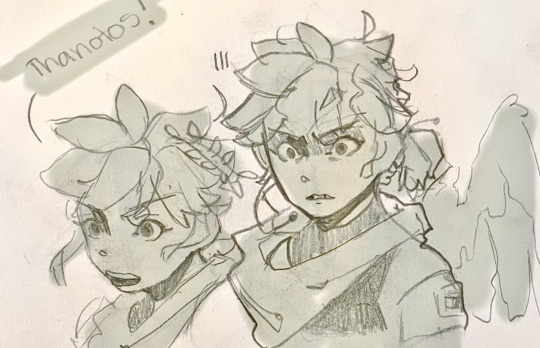
Right now, I think I’m gonna try to keep it to three Pits for simplicity sake. Obviously, Pit from Kid Icarus: Uprising has to be here, that’s our guy. He’s also the protagonist! He’s left relatively unchanged in this AU. This also takes place in a post-game setting, so he’s already fought Hades. This applies to the other guys as well, even if their hypothetical “games” and adventures aren’t actually real (Factor) or heavily rewritten (Myth) here.
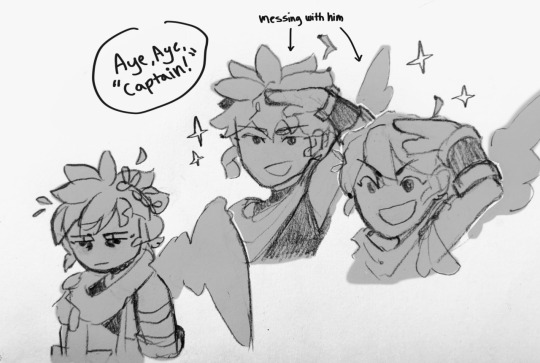
Good news is that Uprising Pit can still communicate with Palutena! But he’s the only one out of the bunch that can. (Would’nt that have been nice? Imagine all the work you could get done with THREE Palutenas [haha reference]). In this AU’s logic, Uprising’s world in the pocket-dimension what-ch-ma-have-it space is closer to the one where this takes place, so (Uprising) Palutena is able to establish a decent enough connection to at least communicate, though it’s not the best. The other Pit’s worlds are further away, so communication with their respective realms are off the table. This also causes other problems like occasionally “bugging out” and forgetting stuff since they’re so far from their original worlds. So Uprising Pit got kinda lucky.

Speaking of other Pits, there’s other Pits! Both of them draw inspiration from things previously done/involved in the franchise so they’re not entirely made up, but they do stray pretty far from their source material. Anyway..first, we have Factor! He’s heavily inspired by Factor 5’s rendition of Pit from their “Icarus” project back in 2007-2008 that was turned down. Here, this AU’s interpretation of the idea is a little more in line with the franchise’s overall light-hearted and goofy nature. (In this AU the Pit’s are taken from different points in time, so he would’ve been plucked from the future. I did this so 1. They all could look visually distinct from each other, and 2. the thought of Factor going “oh he doesn’t know about [x] yet” or Uprising Pit insisting Myth to NOT go after the wish seed in the future was funny.)
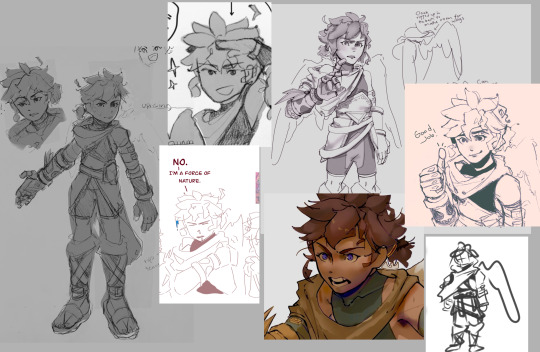
Next…there’s Myth! He’s based on Kid Icarus: of Myths and Monsters, and besides a few plot points he’s pretty much just a modern take on the character. He was easier to pin down because while the concept of Factor’s story was interesting, being banished from the heavens for some unspecified crime, it’s pretty vague in comparison. With Myth, there’s an entire game with a plot to go off of, even if this AU strays a bit from it.

That’s pretty much the basics of this AU! Just a couple of Pits going on an adventure getting into other-worldly shenanigans. I’m having a ton of fun with it and hopefully I can develop the idea more as I go along. Thanks for reading! There’s some extra footnotes and miscellaneous doodles below.

• This AU follows the idea that oMaM takes place in a different timeline than Kid Icarus: Uprising, hence it not being referenced (at least not on purpose, I’m looking at you aurum track accidentally having the same intro motif) or mentioned. Plus y’know, Sakurai not knowing it existed so there’s that. Might as well rework it into a weird explanation. (coping)
• All of these worlds take place in different timelines, so Factor isn’t an older version of Uprising Pit, nor is Uprising an older version of Myth. They’re all still Pit, and all of them have fought Medusa, but it had different outcomes (somewhat based on the endings) and at that point they diverged from each other. • I’ll probably change the naming of the Pits at some point. While they’re good right now, I’m not sure if I wanna keep Factor named after a company. Might have their names based off the titles of their respective games, so instead of “Factor”, “Myth”, and “Uprising” it’d be “Icarus” (based on the project’s internal name), “Myth”, and “Uprising”.
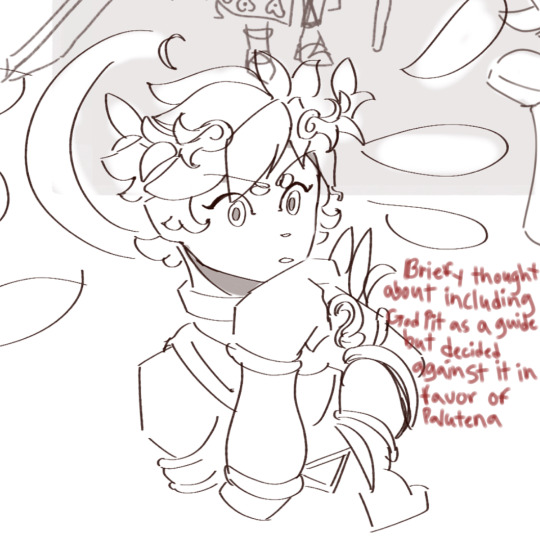
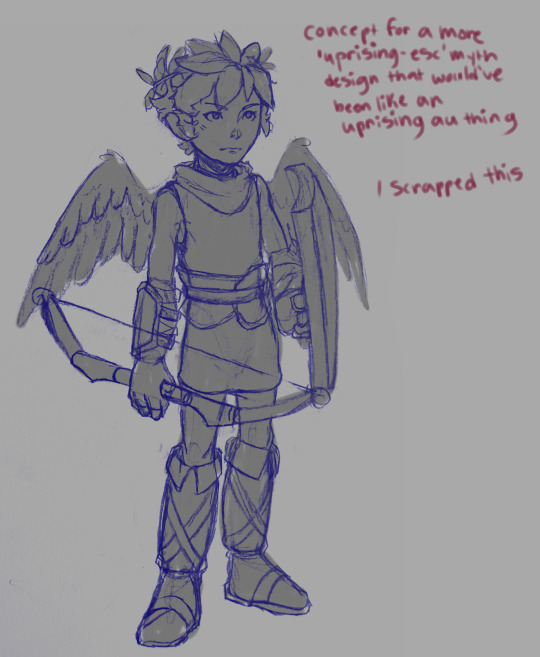
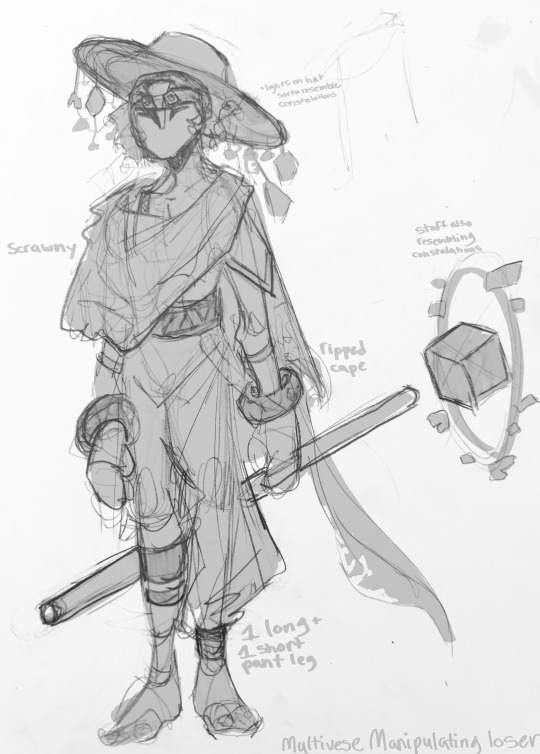
81 notes
·
View notes
Note
what's your process for writing? :3
my writing process: I stare at my document file for hours and weep, repeat until writing gets miraculously done.
In all seriousness I tend to already have outlines ready for future chapters and stuff like that ready (and an idea of what I'd like to happen in the arcs/timeline of events). I've already had like a vague outline of my entire fic as a whole, but that's just kind of my own version of what happens in FNAF LMAO. I also just sometimes brainstorm, imagine new scenes that seems fitting for future chapters and list it down for me to write!
Though sometimes, even my writing execution just sometimes makes me have to divert/change plans up for chapters since sometimes writing's a bit unpredictable and sometimes some ideas I have just come out of nowhere/don't work anymore!
I talk back and forth about ideas with some friends/my alpha reader and bounce back ideas between them! It's really fun brainstorming with people and being able to put my ideas into words before writing it down. I also sometimes draw it out as concept art since it's fun visualizing some of my ideas!
Of course I still base most of the ideas from the actual source material (the games, some parts of the book trilogy) but since this is an AU I'm allowed to explore some "what-if" ideas and be able to have some creative freedom with it without worry since it is an AU after all! I get to do/explore things the way I want without worrying about judgment since this isn't really canon-compliant.
I take very long in actual writing stage (for obvious reasons), and after completing my rough/first draft I let it sit for a few days or a week before reading it again with a fresh pair of eyes and edit/revise/add new scenes accordingly. Sometimes I just make scenes out, no matter how bad it may be at first, and then just let revising/editing do my work for me. Sometimes I also have readied drafts for some scenes of future chapters that I can come back to, put it in the document and just rewrite it/rework it to be better suited for the narrative.
I tend to take my time longer during the editing/revising stage for a lot of things; I'm a perfectionist, I tend to sort of heavily criticize my work, and I worry a lot about its quality at the end of the day, and sometimes I realize that I need to fully revise the scene or fully rewrite a scene since it's lacking something/I'm missing a scene that should essentially be there. It's a hard battle, and an admittedly frustrating process.
That, and irl responsibilities makes it hard to just read through it sometimes.
During those breaks I sometimes read books/literature so that I can come back to editing/revising with fresh new knowledge on how I can improve or be able to know how I'll handle writing again.
After editing/revising is done, I just hand off the beta-reading to my beta readers, which also takes a while; we're all having irl responsibilities after all, and I mostly go to them back and forth about their feedback since it is nice having fresh eyes on your work WHILE also getting feedback from "first-time readers" of my work and what the readers might think of it when I publish it. They also help me with minor editing stuff since I'm not an English speaker (English isn't my first language) and their feedback really helps!
And then I usually draw out the cover chapter, and when my chapter's published, I do a nice little celebration for myself, since I take very long on chapter updates/making the actual chapters! It's important to celebrate the little victories we have, after all :]
Sorry for the SUPER long post, but since it is the writing process, I might as well share the ups and downs of my own writing process anyway XD Hope this helps?
19 notes
·
View notes
Note
saw ur post about going incognito into spaces and stuff and i wanted to add my own thoughts about my experience of basically being stuck in places where proshippers r hated (not against wut ur saying! i definitely agree that theres no benefits and honestly its not that fun)
the fandom that im currently in is.. very toxic. someone got harassed to the point of having to delete their account bc they "supported" a proshipper (it was literally just them saying that u shouldnt harass this person just bc theyre proship-). a lot of my friends were very supportive of this person and agreed that ppl shouldnt be harassed over shit like that and many of them seem to have similar viewpoints as me (anti harassment and all that) but prefer to stay away from that stuff
the fandom is basically ran by antis. theres a small corner that some ppl have made where they talk about proship stuff freely (love those ppl so much theyre genuinely so nice) but overall its. not the best place to be if ur proship. which is interesting to me bc theres actually a shocking amount of proshippers that just... dont say anything. on my side blog ive had multiple ppl interact that i thought were anti (or at least just. not proship in some way) but would literally go and like all my posts about incest ships of the characters.
and sometimes i think about it and how theres actually a bunch of proshippers but we're so heavily harassed and silenced that we just- dont say anything. but the fandom is small and we cant exactly separate ourselves from it if we really like the show. and i feel especially bad for some of the bigger blogs that ppl love and adore bc i know wut would happen if somehow ppl found out and made some big post or wutever.
i dont pretend to be antiship but i dont outright say im proship unless i really trust that person
im currently trying to make my own lil space with some friends so at least if anything goes wrong i at least have a few ppl but its a bit scary to think about honestly-
Although it can be full of snot-nosed superiority complexes, I do recommend using the AO3 Subreddit in order to find likeminded people for your fandom. The very vast majority of the AO3 Subreddit is proship or at least proship neutral. Antis are generally eviscerated on sight whenever they try to poke their nose into it.
If you have any other fandoms that you are active in or have friends within, there's also no harm in introducing them to your small fandom.
From what I understand the Marvel fandom did kind of the same thing you're describing with the Starker shippers, but they flourished and supported each other anyway.
I know its easy for me to simply say 'do it anyway' as someone who generally could not give a fuck about anyone's opinion of me, but honestly. Do it anyway. Form your little collective. Support each other. Learn how to write and draw and make GIFs so you feed your own portion of the fandom. You physically do not need those people, it just unfortunately takes a bit of effort and means potentially a bit less content until you start really generating your own.
Fandom spaces do not start out from nothing. Promote the shit out of your fandom. Draw people in. Comb through the proship tags and send asks to blogs like mine asking other proshippers to check out the source material.
People in small fandoms are easy to bully because you're so enclosed into this circle of the exact same people. They happen to be the majority in the room and they're weaponising it.
Force them into a bigger room.
#myfandomrealitea#sephiroth speaks#fandom#proship#proshipping#small fandom#fandom culture#fandom mentality
39 notes
·
View notes
Text
The Emperor wasn't 12 feet tall
I see this meme a lot in my Instagram feed and it really grinds my gears:
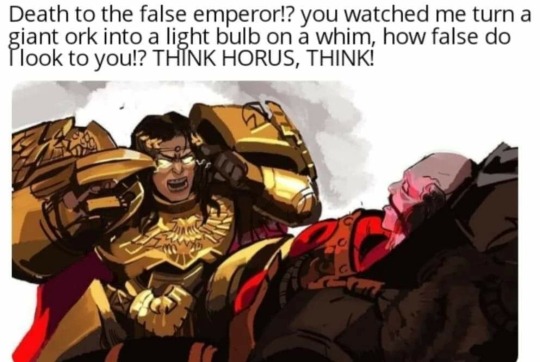
Not because it seems to be trying to shame a fictional antagonist for being "wrong" (although that really doesn't help), but because whoever made it seems to have missed that depictions of the Emperor as superhuman are meant to be Imperial Propaganda.
Now, I realise I'm going to be fighting an uphill battle here because there seem to be people working for Games Workshop and producing their media who also missed that memo, and for a while now the studio has started producing actual depictions of the Emperor, and some of those depections show him as 12 feet tall and immortal. This might be controversial but I think what this shows is that Games Workshop don't understand Games Workshop's source material.
Here's a picture of the Emperor from the original Rogue Trader rulebook.
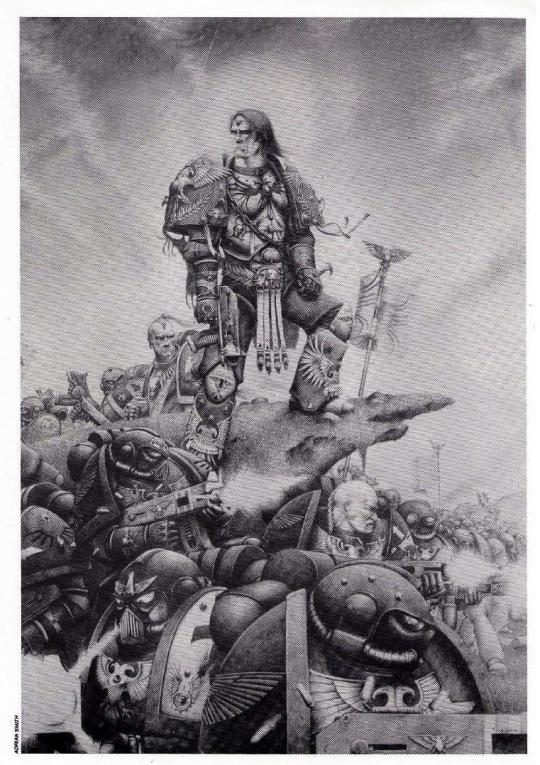
Even this is obviously meant to be a propaganda image, but here he looks like just a regular guy in armour, he's about the same size as the people around him. Not a superhuman, just a guy with an excess of hubris.
There's this literary construct called the unreliable narrator. When I studied literature we were given this short story to read called Bartleby the Scrivener. It's told from the point of view of an employer about a clerk who was apparently really difficult to manage. The subtext is that the narrator is trying to manipulate the reader to make themself look good.
For a long time, that's what Warhammer 40,000 did, the Imperium was made out to be an unreliable narrator. Stories about the Imperium's "glorious past" were told through the haze of ten thousand years of unending war, by an ecclesiastical class with a vested interest in keeping Imperial citizens committed to feeding the war machine. To the Imperium, the Great Crusade and the Horus Heresy serve the function of myths, more than history. I've gone on before about how important heroic figures like Siegfried and Perseus and Prometheus were to the Nazis. The Imperium, being a fictional state that draws on the aesthetics and ideology of Fascism, uses the figures of the Emperor and Primarchs the same way.
Basically what I'm saying is that when Imperial sources state that these people were twelve feet tall and immortal and could, um, turn a giant ork into a lightbulb on a whim, it's not because they had these powers, but because they've been ascribed these powers by their priesthood, who have total control over the flow of information in this setting.
And I get that this is hard, because most people don't get taught this stuff, and often people are probably looking for escapism from their fiction and why would the book I'm reading lie to me? But I think it really makes the setting more interesting if you look at it this way.
Also, I realise that since 2006 there have been books around that describe the Emperor, and they do show him as superhuman, and I think those depictions are based on the writers misunderstanding the material they're working from. I guess Tolkien wrote the existence of The Hobbit into Middle Earth as the Red Book of Westmarch so I can tell myself that the Horus Heresy novels are meant to be in-universe Imperial propaganda.
ADDENDUM: I need to add this because I've been reading about Perpetuals, which is apparently what the Emperor is since the Horus Heresy series was published. Apparently these individuals are human mutants that are both immortal and invincible. I remember Mechanicum heavily implying that the Emperor and St. George are the same person. Here's the problem with that. There are two themes that I think are really important in Warhammer 40,000. One is the Emperor's hubris, the idea was that he was playing god, genetically engineering monstrosities in the form of the primarchs. In the Greek tragic mould, it's this hubris that leads to his downfall. This kind of loses its sting if he's just trying to recreate what what he already is.
The other theme is the Imperium's superstition. This one is really the core of 40K. The Imperium has taken the corpse of a man who tried to rule the galaxy, told themselves he's not dead, plugged the corpse into a machine that "regenerates" him, and founded an intolerant, violent and expansionist religion around this husk. This theme changes significantly if the Emperor actually was as powerful as the Ecclesiarchy makes him out to be, and actually isn't dead, and has somehow been regenerating for the last 10,000 years. There's a question here about what would make an entity worthy of worship, or being called a god, and I probably shouldn't get into it but this is my blog so I'm going to. It seems like there's an assumption among some writers that if something can be rationally explained then it's not a god, because gods ipso facto don't exist. They've incorporated nonexistence into their definition of gods. This is where you get the idea that the Chaos gods aren't gods, because the setting explains their existince "rationally" with its internal logic (nevermind that there's nothing rational about the warp). If there were gods in a rational sense, then our model of the universe would have to change to accomodate them. I think the upshot of this is basically that if what the Horus Heresy novels claim about the Emperor is true, then the Ecclesiarchy are right and he is a god within the logic of the setting. That doesn't justify the genocide and expansionism, but maybe it does justify the worship, and that's something that I think takes away from the setting.
77 notes
·
View notes